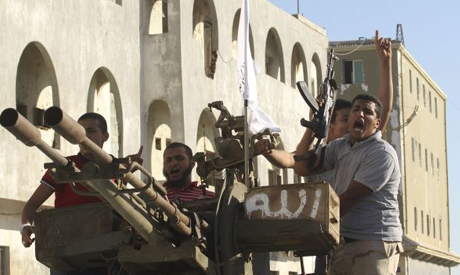
The chief prosecutor of the International Criminal Court said Tuesday there were indications of war crimes being committed in Libya, warning that the strife-torn country was "on the wrong path."
Fatou Bensouda told the UN Security Council that the violence in Libya had worsened over the past six months with the country now split between two governments and two parliaments vying for control.
"There are, indeed, indications that crimes that fall within the jurisdiction of the International Criminal Court are being committed," Bensouda told the council.
The chief prosecutor described as "worrisome" an ongoing spate of assassinations in Benghazi, Libya's second city, threats to journalists, human rights activists and women in particular as well as to prosecutors, judges and lawyers.
"These troubling developments are clear signs that Libya is descending on the wrong path on its transition to what was hoped would be a peaceful country that respects and pays homage to the rule of law, justice and accountability," she said.
Fighting between rival militias has flared since the 2011 overthrow of dictator Muammar Gaddafi.
Islamist militants seized the capital Tripoli in August, forcing the internationally-recognized government and parliament to move to the east.
The prosecutor reiterated a demand for the Libyan government to hand over Gaddafi's son, Saif al-Islam, for prosecution by the ICC in the Hague and said she may review the decision to allow the trial in Libya of Gaddafi's intelligence chief Abdullah al-Senussi.
Despite the growing concern over alleged mass crimes, Bensouda said that her office had been forced to scale down investigations in Libya due to lack of resources.
Human Rights Watch said it had documented attacks on civilians by armed militias that may amount to war crimes, politically-motivated assassinations and cases of torture, forced displacement and arbitrary detentions that could amount to crimes against humanity.
The rights group is asking the UN Human Rights Council to set up a commission of inquiry to investigate violations by all sides.
Fatou Bensouda told the UN Security Council that the violence in Libya had worsened over the past six months with the country now split between two governments and two parliaments vying for control.
"There are, indeed, indications that crimes that fall within the jurisdiction of the International Criminal Court are being committed," Bensouda told the council.
The chief prosecutor described as "worrisome" an ongoing spate of assassinations in Benghazi, Libya's second city, threats to journalists, human rights activists and women in particular as well as to prosecutors, judges and lawyers.
"These troubling developments are clear signs that Libya is descending on the wrong path on its transition to what was hoped would be a peaceful country that respects and pays homage to the rule of law, justice and accountability," she said.
Fighting between rival militias has flared since the 2011 overthrow of dictator Muammar Gaddafi.
Islamist militants seized the capital Tripoli in August, forcing the internationally-recognized government and parliament to move to the east.
The prosecutor reiterated a demand for the Libyan government to hand over Gaddafi's son, Saif al-Islam, for prosecution by the ICC in the Hague and said she may review the decision to allow the trial in Libya of Gaddafi's intelligence chief Abdullah al-Senussi.
Despite the growing concern over alleged mass crimes, Bensouda said that her office had been forced to scale down investigations in Libya due to lack of resources.
Human Rights Watch said it had documented attacks on civilians by armed militias that may amount to war crimes, politically-motivated assassinations and cases of torture, forced displacement and arbitrary detentions that could amount to crimes against humanity.
The rights group is asking the UN Human Rights Council to set up a commission of inquiry to investigate violations by all sides.

No comments:
Post a Comment
Note: Only a member of this blog may post a comment.